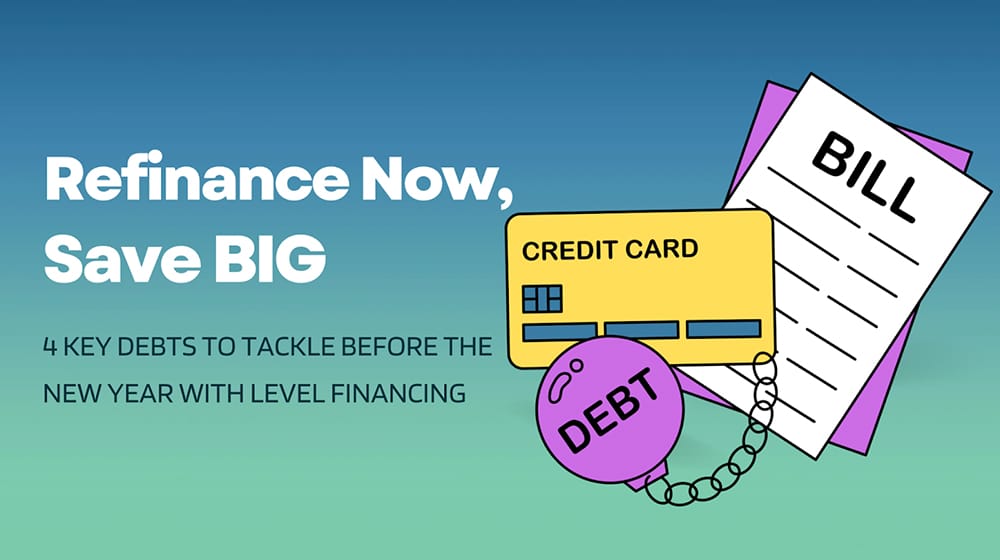When managing your current debt obligations becomes challenging, debt consolidation is one way to make your life easier. This term refers to the action of taking out a new loan to merge multiple debts into one.
The main advantage usually lies in the new loan’s better borrowing conditions compared to your current ones. This means a lower interest rate or a more extended repayment period, or both. As a result, you will make only one monthly payment for a lower amount than what you are currently paying on your existing debt.
Debt consolidation is not the same procedure as debt resolution and debt management. The former refers to hiring a debt settlement company or an attorney to negotiate a reduction in the principal you owe. The latter aims to make your monthly payment (or payments) lighter by negotiating a reduction in your interest rate or fees.
This article will give you some helpful tips on how to get a loan for debt consolidation, as well as explain the technical aspects of this process.
Debt Consolidation: a Real-Life Example
Let’s assume that you are currently making four different payments on your multiple debts, which are:
- first credit card
- second credit card
- student loan
- car loan
Here are your balances, interest rates, and monthly payments for each debt obligation.

Overall, you are currently paying $1,075 a month to your lenders.
What if you consolidated these obligations by taking out a 60-month loan with the following conditions?
- A total loan amount of $36,800.
- A 10% interest rate.
In this scenario, you would have to make only one monthly payment of $782, a considerably lower sum than what you are paying now! On top of that, you would be debt-free in 5 years, a shorter time than the period you need to repay your current student loan.
Are Federal Loans Eligible for Consolidation?
With the same method, you can consolidate various federal loans. These include:
- Direct student loans (both subsidized and unsubsidized)
- Federal Stafford loans (both subsidized and unsubsidized)
- Direct PLUS loans
- SLS (Supplemental Loans for Students)
- Health Education Assistance Loans
What Loan Can I Take Out to Consolidate My Debt?
You can use various loan types to consolidate your current debt. Here are the most common ones.
Unsecured Personal Loans
Forbes lists debt consolidation as one of the main reasons for taking out a personal loan.
Unsecured personal loans don’t require collateral, meaning you won’t risk losing your house or other assets if you can’t repay your creditor. However, unsecured personal loan providers ask for more checks on your financial situation. Here are some of the factors lenders look at when evaluating your unsecured personal loan application:
- your employment situation
- your debt-to-income ratio
- your FICO score
A better credit score can also help you obtain a lower interest rate (and thus a lower monthly payment) on your debt consolidation loan. For this reason, taking out an unsecured personal loan for debt consolidation is a great move if your credit score has improved a lot recently and you now have excellent credit.
Looking for a provider of unsecured personal loans that offers favorable conditions in terms of interest rate and repayments period can be a very effective way to consolidate your debt. Online lenders offer particularly favorable conditions thanks to lower overhead compared to traditional banks.
For example, Level Lending offers an uncomplicated application process and very attractive rates for personal loans of up to $55,000. Set your preferred amount and answer the quiz to receive a free loan offer in no time. If you have additional doubts and questions on how an unsecured personal loan can help you consolidate your current debt, give us a call at 888-922-4015. Our staff will be delighted to assist you.
Secured Personal Loans
If you have poor credit or your debt and income situation discourages lenders from accepting your unsecured loan application, you can resort to secured personal loans.
These instruments allow you to give sufficient guarantees to lenders by using an asset or a certain sum of cash as collateral. If you can’t pay the loan back, the lender will take control of your collateral.
A secured loan can be a clever way to consolidate your current debt if you have assets that you are willing to sacrifice in the worst-case scenario.
Please note that some lenders offer personal loans without collateral to borrowers with bad credit, so make sure you check all unsecured debt possibilities before resorting to a loan that puts your assets at risk.
Home Equity Loans and HELOCs
Home equity loans allow you to use the equity that you have in your house as collateral. By equity, we mean the difference between your home’s current value and what’s still left of your mortgage.
A HELOC (Home Equity Loan of Credit) is a very similar instrument, but instead of borrowing a lump sum, it works more like a credit card. You can borrow a sum at your discretion and up to a specific limit, which is tied to your home’s equity.
Balance Transfer Credit Card
A balance transfer card is a very convenient instrument for credit card debt consolidation. It allows you to transfer the balance you owe on multiple credit cards to a single, new card.
One of its most attractive traits is an initial period during which you don’t pay any interest and can therefore make payments entirely toward your principal. This introductory period can range from 10 to 20 months.
Read More: What are Balance Transfers?

Is Debt Consolidation Better Than Other Debt Reduction Strategies?
When your current debt situation is difficult to sustain, there are various solutions you can adopt to ease the burden. Let’s see when debt consolidation is the best alternative and when it’s advisable to recur to other options instead.
Debt Consolidation vs. Debt Resolution
As we just saw, debt consolidation simplifies and reduces monthly payments, it doesn’t lower the principal you owe to your lenders. In contrast, debt resolution involves resorting to a debt settlement company or attorney to negotiate with your creditors and obtain a reduction in the total sum you owe.
If you think you are in a position to make your monthly payments more sustainable by simply taking out a new loan at more favorable conditions, then debt consolidation is the best choice. That’s because debt resolution may harm your FICO score initially, and not every lender may be willing to settle.
However, if you think your current debt situation has become too much to handle or it’s causing significant damage to your personal life and psychological health, hiring a debt settlement company to negotiate a debt reduction with your creditors may be the most effective move.
Debt Consolidation vs. Debt Management
While debt consolidation aims at reducing your monthly paying by taking out a new loan at lower interest rates and/or with longer repayment periods, a debt management plan follows a different approach to reach the same goal.
Through a negotiation aimed at reducing your interest rate and fees charged by your current lenders, it makes your monthly payments more manageable and also reduces the time it takes to fully repay your debt. It’s a strategy to consider if you are not just trying to make your regular payments lighter but also wish to be debt-free as soon as possible.





